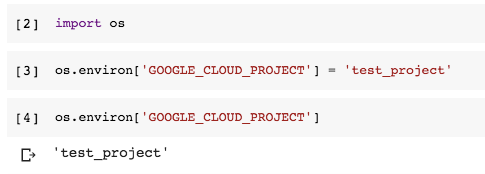-
Notifications
You must be signed in to change notification settings - Fork 119
New issue
Have a question about this project? Sign up for a free GitHub account to open an issue and contact its maintainers and the community.
By clicking “Sign up for GitHub”, you agree to our terms of service and privacy statement. We’ll occasionally send you account related emails.
Already on GitHub? Sign in to your account
Set project_id (and other settings) once for all subsequent queries so you don't have to pass every time #103
Comments
|
Can you go into more detail on why the env variables aren't sufficient? The Google libraries generally natively support |
|
I agree that there are times when it is more convenient to set the project once in code versus using an environment variable. For example, users in a hosted notebook environment like https://colab.research.google.com wouldn't be able to set an environment variable. |
|
Question for the Pandas folks: is there a standard way to set default / config options in Pandas? For example, Flask has a config object/dictionary. |
|
There are pandas configs with |
|
I hear you about environment variables as being possible, but it just doesn't feel very user friendly. And while GOOGLE_CLOUD_PROJECT might be used by other libraries or elsewhere, some of the possible environment variables (for instance the query dialect) would probably never be used outside of pandas-gbq which makes it weird to set at the system level. Yeah, the way pandas uses set_option might be a good comparable. We could have a separate function called set_options which saves these gbq-level settings. Downside I guess is having to go through the code and pointing to these new settings? The upside of creating the new wrapper class above is that it doesn't touch any existing code, but then again, not sure which would be more maintainable in the future. Either way, we should probably come up with some sort of solution for these common settings, be it an environment variable (which we don't currently handle), a set_options function, or a wrapper class. Even on an aesthetic level not to mention the wasted code, scrolling through notebooks with all these |
|
An intermediate step we could take is to make the |
+1 |
|
+1 also to getting project_id from google-auth for now. Just make sure that setting GOOGLE_CLOUD_PROJECT (or whatever) via env variable in script should override however google-auth figures it out. This way notebooks are reproducible with minimal tweaks in case querying from or to a project needs specific project permissions. Still need to figure out where dialect, verbose, and other settings live, but this would be a great first step! |
|
If we want to reuse more than project_id, one option would be to house config options in a GBQConnector class, which would be an optional parameter to pass into gbq functions |
|
#127 is the first step in this. |
|
Any solution we come up with for defaults should also work with the common way of accessing this library via Thinking aloud: what if we had a global |
|
I do still think that making |
|
A temporary solution to this issue using |

One frustrating thing is having to pass the
project_id(among other parameters) every time you write a query. For example, personally, I usually use the same project_id, almost always query with standard sql, and usually turn off verbose. I have to pass those three with everyread_gbq, typing which adds up.Potential options include setting an environment variable and reading from these default settings, but sometimes it can be different each time and fiddling with environment variables feels unfriendly. My suggestion would perhaps be to add a class that can wrap
read_gbq()andto_gbq()in a client object. You could set the project_id attribute and dialect and whatever else in the client object, then re-use the object every time you want a query with those settings.A very naive implementation here in this branch:
https://github.com/pydata/pandas-gbq/compare/master...jasonqng:client-object-class?expand=1
Usage would be like:
Does that seem like a reasonable solution to all this extra typing or is there another preferred way? If so, I can open up a PR with the above branch.
Thanks, my tired fingers thank you all!
@tswast @jreback @parthea @maxim-lian
The text was updated successfully, but these errors were encountered: